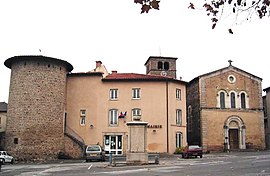Brindas
Appearance
Brindas | |
|---|---|
 Left to right: The tower, the town hall and the church | |
| Coordinates: 45°43′19″N 4°41′39″E / 45.7219°N 4.6942°E | |
| Country | France |
| Region | Auvergne-Rhône-Alpes |
| Department | Rhône |
| Arrondissement | Lyon |
| Canton | Brignais |
| Intercommunality | Vallons du Lyonnais |
| Government | |
| • Mayor (2020–2026) | Frédéric Jean[1] |
Area 1 | 11.27 km2 (4.35 sq mi) |
| Population (2022)[2] | 6,718 |
| • Density | 600/km2 (1,500/sq mi) |
| Time zone | UTC+01:00 (CET) |
| • Summer (DST) | UTC+02:00 (CEST) |
| INSEE/Postal code | 69028 /69126 |
| Elevation | 232–371 m (761–1,217 ft) (avg. 326 m or 1,070 ft) |
| 1 French Land Register data, which excludes lakes, ponds, glaciers > 1 km2 (0.386 sq mi or 247 acres) and river estuaries. | |
Brindas (French pronunciation: [bʁɛ̃da]) is a commune of the Rhône department in eastern France.
Geography
[edit]It lies about 15 km (9,5 mi) South-West of Lyon, but not included in the Metropolis of Lyon.
History
[edit]Brindas is often regarded as the second home of Guignol, a French puppet show from Lyon. The name of the village was often quoted in parts of Guignol plays as several Guignol entertainers used to spend holiday time in this village. Pierre Neichthauser, mayor of Brindas from 1929 until 1940, was also the puppeteer for the character Gnafron in his Guignol Mourguet theatre.
A Guignol museum-theater ("Musée-théâtre Guignol") was opened in Brindas in 2008 (year of Guignol's bicentenary).
Population
[edit]| Year | Pop. | ±% p.a. |
|---|---|---|
| 1968 | 1,560 | — |
| 1975 | 2,097 | +4.32% |
| 1982 | 3,204 | +6.24% |
| 1990 | 3,555 | +1.31% |
| 1999 | 4,555 | +2.79% |
| 2007 | 5,341 | +2.01% |
| 2012 | 5,651 | +1.13% |
| 2017 | 6,174 | +1.79% |
| Source: INSEE[3] | ||
See also
[edit]Communes of the Rhône department
References
[edit]- ^ "Répertoire national des élus: les maires" (in French). data.gouv.fr, Plateforme ouverte des données publiques françaises. 13 September 2022.
- ^ "Populations de référence 2022" (in French). The National Institute of Statistics and Economic Studies. 19 December 2024.
- ^ Population en historique depuis 1968, INSEE
External links
[edit]Wikimedia Commons has media related to Brindas.




